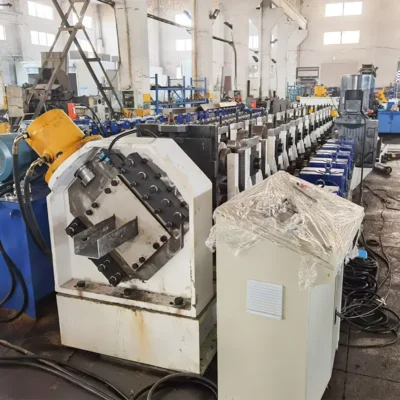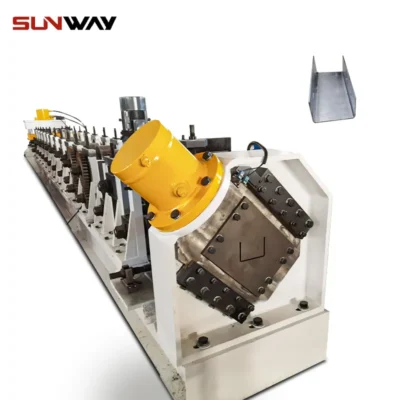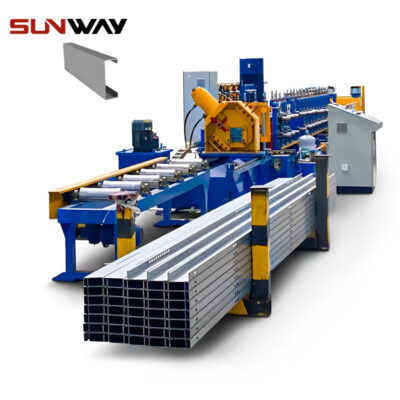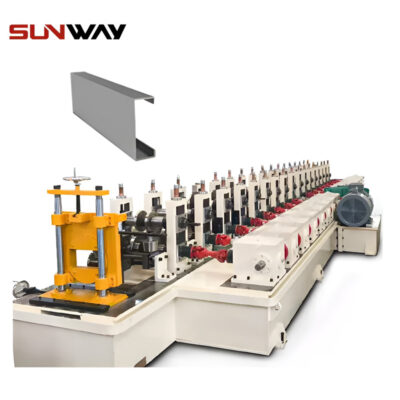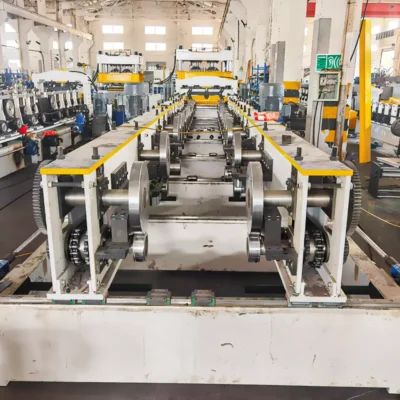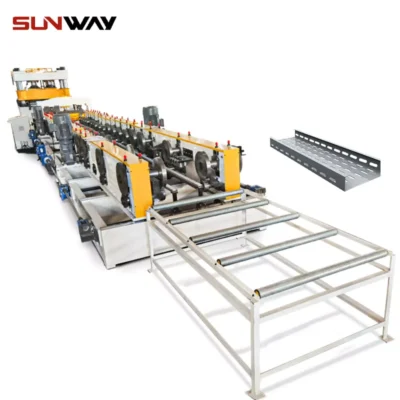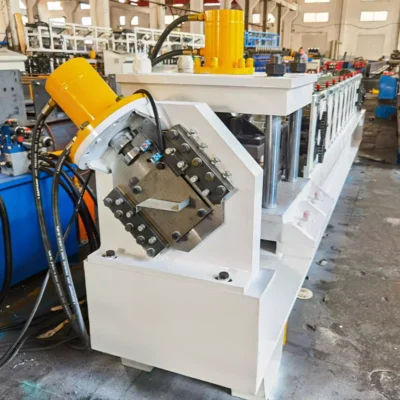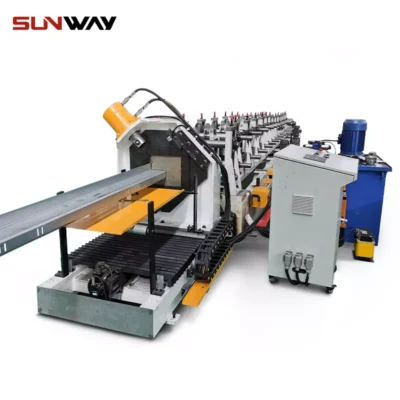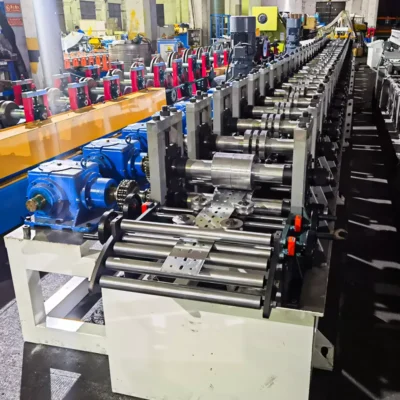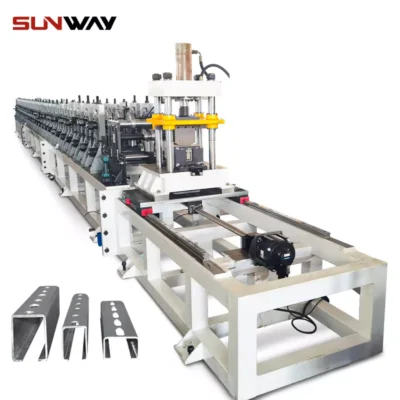Pipelines are the lifelines of modern infrastructure, transporting oil, gas, water, and other essential resources across vast distances. The efficiency and reliability of pipeline systems depend on the quality of their components, particularly the pipes themselves. Enter the Pipeline Roll Forming Machine—a game-changing technology that enables the mass production of high-strength, precision-engineered pipeline sections.
Whether for energy transportation, water supply, or industrial systems, Pipeline Roll Forming Machines are redefining how pipelines are manufactured. These machines offer unmatched speed, durability, and design flexibility, making them an essential tool for industries worldwide. In this comprehensive guide, we’ll explore applications, machine features, production workflows, pricing, market trends, and why Wuxi Sunway Machinery is a global leader in roll-forming solutions tailored for pipeline production.
What is a Pipeline Roll Forming Machine?
ক Pipeline Roll Forming Machine is a specialized system designed to manufacture metal pipes and tubes used in various industries. These machines transform flat metal coils—typically carbon steel, stainless steel, or aluminum—into cylindrical or rectangular pipeline sections with precision and efficiency.
Types of Pipelines Produced
- Oil and Gas Pipelines: High-strength pipes for transporting crude oil, natural gas, and refined products.
- Water Supply Pipelines: Corrosion-resistant pipes for municipal and industrial water systems.
- Industrial Pipelines: Pipes used in manufacturing plants, chemical industries, and refineries.
- HVAC Ducts and Tubes: Lightweight pipes for heating, ventilation, and air conditioning systems.
- Custom Pipes: Designed for unique applications such as underground cables, irrigation, and structural support.
By automating the roll-forming process, these machines ensure precision, scalability, and cost-efficiency, meeting the increasing demand for durable and high-quality pipeline systems.
Applications of Pipeline Roll Forming Machines
The versatility of Pipeline Roll Forming Machines enables them to cater to a wide array of industries and projects. Below are some of the most common applications:
1. Oil and Gas Industry
- Use Case: Manufacturing high-pressure pipelines for oil and gas transportation.
- Why It Matters: Ensures the safe and efficient movement of energy resources over long distances.
2. Municipal Water Supply Systems
- Use Case: Producing corrosion-resistant pipes for urban and rural water distribution networks.
- Why It’s Essential: Delivers clean and safe water to homes, businesses, and industries.
3. Industrial Processing Plants
- Use Case: Crafting pipes for transporting chemicals, steam, and other industrial fluids.
- Why It’s Critical: Provides reliable and leak-proof solutions for complex industrial systems.
4. Renewable Energy Projects
- Use Case: Producing pipes for wind farms, solar thermal systems, and geothermal installations.
- Why It’s Relevant: Supports the infrastructure needs of sustainable energy projects.
5. Construction and Structural Applications
- Use Case: Manufacturing pipes for scaffolding, structural supports, and underground cable protection.
- Why It’s Useful: Combines strength and flexibility for diverse construction applications.
6. HVAC and Mechanical Systems
- Use Case: Producing lightweight ducts and tubes for heating, ventilation, and cooling systems.
- Why It’s Important: Ensures energy-efficient and reliable HVAC operations in buildings.
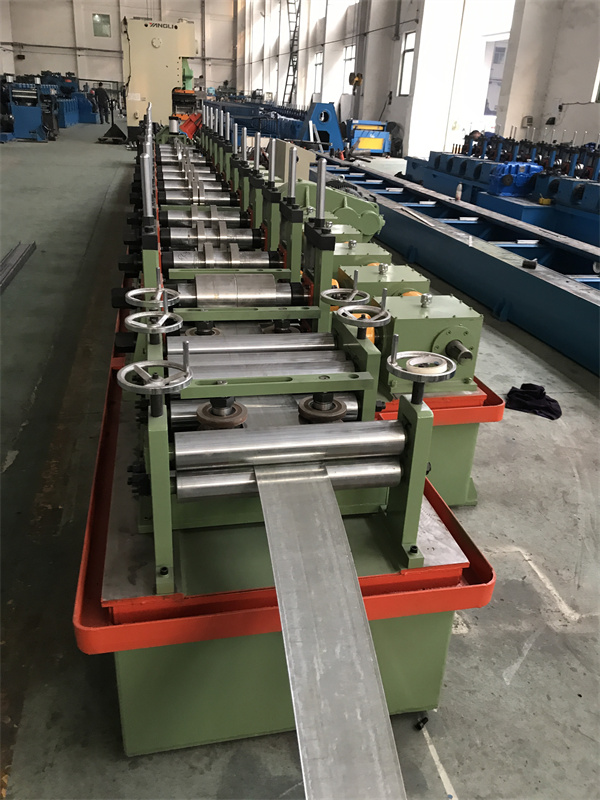
Key Features of Wuxi Sunway Pipeline Roll Forming Machines
Wuxi Sunway Machinery is a trusted name in roll-forming technology, offering innovative solutions for pipeline production. Here’s why their Pipeline Roll Forming Machines are considered industry-leading:
1. High-Speed Production
- Performance: Capable of producing 10–30 meters of pipeline per minute, depending on material and diameter.
- Why It’s Beneficial: Meets the high-volume demands of large-scale pipeline projects.
2. Precision Engineering
- What It Offers: Dimensional accuracy with tolerances as low as ±0.1mm.
- Why It’s Critical: Ensures consistent quality for seamless installation and operation.
3. Multi-Material Compatibility
- Supported Materials:
- Carbon Steel
- Stainless Steel
- Aluminum
- Why It Matters: Allows manufacturers to produce pipelines tailored to specific project requirements.
4. Flexible Diameter and Thickness
- What It Enables: Adjustable tooling for creating pipes of varying diameters and wall thicknesses.
- Why It’s Valuable: Provides versatility to meet the needs of diverse industries.
5. Integrated Welding Systems
- What It Offers: High-frequency welding systems for creating seamless pipe joints.
- Why It’s Essential:
- Ensures leak-proof pipelines for critical applications.
- Reduces secondary operations, saving time and labor costs.
6. IoT and Automation Integration
- What It Enables: Real-time monitoring, automated adjustments, and predictive maintenance using IoT technology.
- Why It’s Game-Changing:
- Enhances production efficiency.
- Minimizes downtime and material waste.
- Provides actionable insights for data-driven decision-making.
7. Modular Design
- What It Provides: Machines with modular configurations that can be expanded or upgraded as production needs grow.
- Why It’s Future-Proof: Accommodates evolving business requirements, making it a cost-effective long-term investment.
Production Workflow of a Pipeline Roll Forming Machine
The production process for pipelines is designed to maximize efficiency and precision. Here’s a step-by-step breakdown:
1. Material Loading
- Metal coils are placed on the machine’s decoiler, which feeds the material into the system.
2. Straightening and Leveling
- A leveling system ensures the material is flat and defect-free before entering the roll-forming section.
3. Roll Forming
- The material passes through a series of rollers that shape it into the desired pipe profile.
4. Welding
- Integrated high-frequency welding systems join the edges of the formed pipe, creating a seamless structure.
5. Cutting to Length
- Hydraulic or precision cutting systems trim the pipes to the required lengths.
6. Quality Inspection
- Finished pipes are inspected for dimensional accuracy, weld integrity, and surface finish.
7. Stacking and Packaging
- Completed pipes are stacked, bundled, and prepared for transportation or delivery to project sites.
Pricing of Pipeline Roll Forming Machines
The cost of a Pipeline Roll Forming Machine depends on its features, production capacity, and customization options. Below is a general pricing guide for 2025:
| Machine Type | Capabilities | Price Range (USD) |
|---|---|---|
| Standard Machines | Basic pipeline production | $200,000–$400,000 |
| Advanced Machines | High-speed and multi-diameter output | $400,000–$800,000 |
| কাস্টমাইজযোগ্য মেশিনসমূহ | Including welding, IoT, and automation | $800,000–$1,500,000 |
For detailed pricing and financing options, contact Wuxi Sunway Machinery.
Market Trends for Pipeline Roll Forming Machines in 2025
The pipeline industry is evolving rapidly, driven by infrastructure expansion and the global push for energy efficiency. Here are the trends shaping the adoption of Pipeline Roll Forming Machines:
1. Global Energy Demand
- The Trend: Rising demand for oil, gas, and renewable energy projects.
- How Machines Help:
- Produce high-strength pipes for energy transportation.
- Ensure compliance with industry safety standards.
2. Urbanization and Infrastructure Growth
- The Push: Rapid urbanization is driving investment in water supply, sewage, and HVAC systems.
- Machine Contribution:
- Enables the production of lightweight and corrosion-resistant pipes for urban installations.
- Supports scalable solutions for growing cities.
3. Sustainability Practices
- The Opportunity: Increasing focus on eco-friendly manufacturing.
- How Machines Help:
- Minimize waste through precise material utilization.
- Process recyclable metals to align with sustainability goals.
FAQs About Pipeline Roll Forming Machines
| Question | Answer |
|---|---|
| What materials can these machines process? | Carbon steel, stainless steel, aluminum, and pre-coated materials. |
| What is the average production speed? | Machines can produce up to 10–30 meters of pipeline per minute, depending on material and size. |
| Can these machines handle custom designs? | Yes, Wuxi Sunway machines are equipped with customizable tooling for bespoke pipeline profiles. |
| Do these machines comply with global standards? | Yes, they meet ISO, ASTM, and other international safety and quality standards. |
| Are these machines energy-efficient? | Absolutely! Wuxi Sunway machines feature energy-saving motors and optimized workflows. |
| What industries benefit most from these machines? | Oil & gas, water supply, construction, renewable energy, and HVAC systems. |
| Is training provided with the purchase? | Yes, Wuxi Sunway offers comprehensive training and after-sales support for all customers. |
Real-World Case Studies of Pipeline Roll Forming Machines
To fully appreciate the transformative impact of Pipeline Roll Forming Machines, let’s review some real-world applications where these machines have driven success.
1. Cross-Country Oil and Gas Pipelines
- Scenario: A leading energy company needed pipelines to connect remote oil fields to urban refineries.
- Machine Contribution:
- Produced high-strength carbon steel pipes capable of withstanding extreme pressure and temperature fluctuations.
- Integrated welding systems ensured the seamless construction of leak-proof pipelines.
- High production speed enabled the company to meet project deadlines, reducing overall costs.
2. Municipal Water Distribution Networks
- Scenario: A city facing water shortages required a new pipeline network to transport water from distant reservoirs.
- Machine Contribution:
- Manufactured corrosion-resistant stainless steel pipes to ensure the longevity of the water supply system.
- Created pipes with precise diameters to optimize water flow and reduce energy consumption in pumping systems.
- Delivered output at scale to accelerate the rollout of the project, minimizing downtime for the city’s residents.
3. Renewable Energy Projects
- Scenario: A solar thermal power plant required pipelines for transporting heated fluid to energy storage systems.
- Machine Contribution:
- Produced aluminum pipes with excellent thermal conductivity and lightweight properties.
- Enabled custom designs to meet the unique specifications of the solar plant.
- Supported the project’s sustainability goals by using recyclable materials and energy-efficient production methods.
4. Industrial Processing Plants
- Scenario: A chemical manufacturing facility needed specialized pipelines to transport corrosive substances safely.
- Machine Contribution:
- Crafted pipes with customized coatings to resist chemical corrosion.
- Delivered high-precision pipes to ensure leak-proof transportation of hazardous materials.
- Supported additional features like integrated flanges and connectors for easy installation.
5. HVAC and Urban Infrastructure
- Scenario: A metropolitan area was upgrading its heating and cooling systems to improve energy efficiency.
- Machine Contribution:
- Produced lightweight ducts and tubes for HVAC installations in residential and commercial buildings.
- Delivered pipes with smooth surfaces to reduce airflow friction, improving system efficiency.
- Supported modular designs that allowed for easy scaling and maintenance of the network.
Automation and Efficiency in Pipeline Roll Forming Machines
Automation is a cornerstone of modern roll-forming technology, and Pipeline Roll Forming Machines are no exception. By integrating advanced automation features, these machines offer unparalleled efficiency, accuracy, and consistency.
1. Real-Time Monitoring
- Feature: IoT-enabled sensors collect data on machine performance, material usage, and production output.
- Advantage:
- Identifies potential issues before they cause downtime.
- Provides actionable insights for optimizing production processes.
2. Automated Adjustments
- Feature: Machines automatically adjust roller configurations to accommodate different pipe diameters and thicknesses.
- Advantage:
- Reduces manual intervention, saving time and labor costs.
- Ensures consistent quality across varying production runs.
3. High-Frequency Welding
- Feature: Built-in high-frequency welding systems create seamless pipe joints.
- Advantage:
- Eliminates the need for additional welding operations.
- Produces pipes with superior structural integrity and leak resistance.
4. Energy Efficiency
- Feature: Optimized motors and workflows reduce energy consumption during production.
- Advantage:
- Lowers operating costs for manufacturers.
- Aligns with sustainability goals by minimizing the carbon footprint.
5. Predictive Maintenance
- Feature: Advanced software uses machine data to predict when maintenance is required.
- Advantage:
- Minimizes unexpected downtime.
- Extends the lifespan of the machine by ensuring timely repairs.
6. Customization Capabilities
- Feature: Programmable controllers allow for the creation of custom pipe profiles and designs.
- Advantage:
- Enables manufacturers to serve niche markets and specialized applications.
- Offers flexibility to adapt to changing market demands.
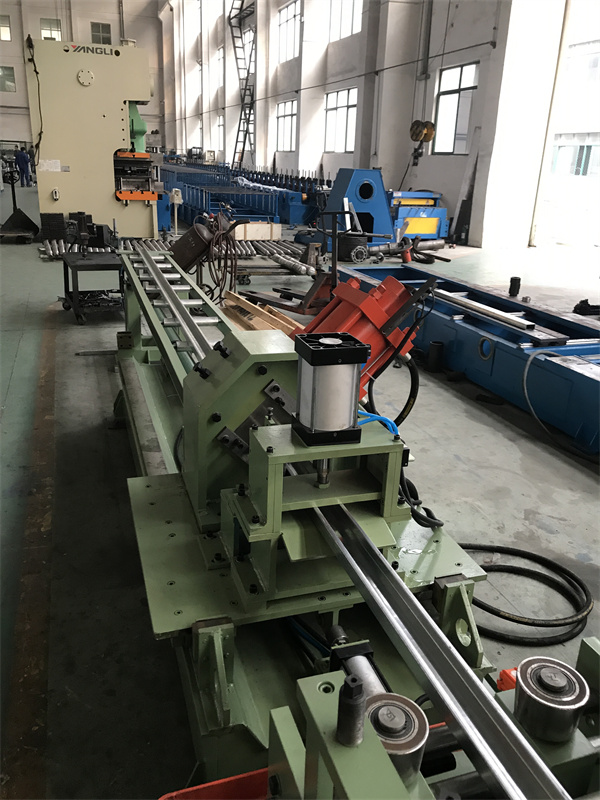
Compliance with International Standards for Pipeline Manufacturing
Pipelines must meet strict international standards to ensure safety, reliability, and environmental protection. Pipeline Roll Forming Machines by Wuxi Sunway Machinery are designed to produce pipes that comply with these rigorous requirements, enabling manufacturers to serve global markets confidently.
| Standard | Region | Requirement |
|---|---|---|
| ISO 3183 | Global | Specifies requirements for steel pipelines used in the petroleum and natural gas industries. |
| API 5L | USA | Covers seamless and welded steel line pipes for transportation systems. |
| EN 10208-2 | Europe | Governs steel pipes for pipelines in the oil, gas, and water sectors. |
| AS 2885 | Australia | Specifies safety and design standards for high-pressure pipelines. |
| JIS G3454 | Japan | Covers carbon steel pipes for pressure service applications. |
By adhering to these standards, Wuxi Sunway Machinery ensures that the pipes produced by their machines are safe, durable, and environmentally friendly.
FAQs About Pipeline Roll Forming Machines
| Question | Answer |
|---|---|
| What materials can these machines process? | Carbon steel, stainless steel, aluminum, and coated metals for various applications. |
| What is the average production capacity? | Machines can produce 10–30 meters of pipes per minute, depending on material and size. |
| Do these machines support automated welding? | Yes, high-frequency welding systems are integrated for seamless pipe joints. |
| Can pipes of different diameters be produced? | Absolutely! Machines are equipped with adjustable tooling to handle varying diameters and thicknesses. |
| What industries benefit from these machines? | Oil & gas, water supply, renewable energy, construction, HVAC, and industrial processing plants. |
| Are these machines energy-efficient? | Yes, they feature energy-saving motors and optimized workflows to reduce electricity consumption. |
| How durable are the pipes produced? | Pipes are engineered for high strength, corrosion resistance, and long service life. |
| Is training provided with the purchase? | Yes, Wuxi Sunway offers comprehensive training and after-sales support for all customers. |
| Do these machines comply with international standards? | Yes, they meet ISO, API, EN, and other global quality and safety standards. |
Why Wuxi Sunway Machinery is the Industry Leader
Wuxi Sunway Machinery has established itself as a pioneer in roll-forming technology. Here’s why manufacturers worldwide trust them for their pipeline production needs:
1. Decades of Expertise
- Wuxi Sunway brings years of experience in designing and manufacturing roll-forming machines tailored to diverse industries.
2. Global Client Base
- The company serves customers across Asia, Europe, the Americas, and other regions, understanding the unique needs of international markets.
3. Cutting-Edge Technology
- Features like IoT integration, automated welding, and customizable tooling set Wuxi Sunway apart from competitors.
4. Sustainability Commitment
- Wuxi Sunway designs its machines to support eco-friendly manufacturing, reducing waste and energy consumption.
5. Comprehensive Support
- From installation to training and after-sales service, Wuxi Sunway ensures a seamless experience for its customers.
Conclusion: Shaping the Future of Pipeline Manufacturing
দ্য Pipeline Roll Forming Machine is at the heart of modern infrastructure development, enabling the production of high-quality, precision-engineered pipes for industries worldwide. With its automation, speed, and adaptability, this machine is revolutionizing how pipelines are manufactured, supporting the energy, water, and industrial systems that power our world.
Ready to transform your pipeline production capabilities? Partner with Wuxi Sunway Machinery today and explore their state-of-the-art roll-forming solutions. Together, we’ll build the pipelines of the future—one section at a time!

